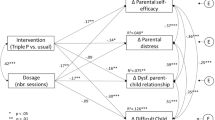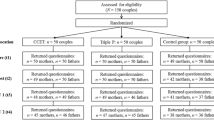Abstract
The significance of enhancing parenting skills to reduce child maladjustment is well-established and supports the important role of evidence-based parenting programs. However, the notion that parenting should be the exclusive focus for enhancing child behavior is necessarily limiting. Evidence is growing that relationship-oriented treatments may be another powerful approach to improve child adjustment, albeit the underlying effects in couple- versus parenting-focused programs have been subject to limited study. The aim of this RCT was to compare the treatment effects of (1) a couple-focused program (the Couples Coping Enhancement Training) to (2) a parenting training (Triple P) and (3) a control group on children’s behavioral problems in 150 couples. The parents’ perceptions of relationship quality, parenting behavior, and child’s behavioral problems were assessed by means of questionnaires completed prior to and 2 weeks after the end of the treatment. Multi-group path analyses revealed that in mothers’ perception the couple-focused program reduced child behavioral problems by enhancing the relationship quality whereas improved parenting mediated the benefits in the parenting training. In fathers’ evaluations the couple-focused program reduced dysfunctional parenting which largely accounted for the benefits in child adjustment. The dearth of research on child outcomes in couple-focused intervention studies is a striking gap that should be overcome. It is a promising field because of its evident potential to foster the health of many children.

Similar content being viewed by others
References
Arnold, D. S., O’Leary, S. G., Wolff, L. S., & Acker, M. M. (1993). The Parenting Scale: A measure of dysfunctional parenting in discipline situations. Psychological Assessment, 5(2), 137–144. doi:10.1037/1040-3590.5.2.137.
Barletta, J., & O’Mara, B. (2006). A review of the impact of marital conflict on child adjustment. Australian Journal of Guidance and Counselling, 16, 91–105. doi:10.1375/ajgc.16.1.91.
Bentler, P. M. (1990). Comparative fit indexes in structural models. Psychological Bulletin, 107(2), 238–246. doi:10.1037/0033-2909.107.2.238.
Bodenmann, G. (1997). Dyadic coping—A systemic-transactional view of stress and coping among couples: Theory and empirical findings. European Review of Applied Psychology, 47, 137–140.
Bodenmann, G. (2005). Dyadic coping and its significance for marital functioning. In T. A. Revenson, K. Kayser, & G. Bodenmann (Eds.), Couples coping with stress: Emerging perspectives on dyadic coping (pp. 33–50). Washington, DC: American Psychological Association.
Bodenmann, G., Bradbury, T. N., & Pihet, S. (2008a). Relative contributions of treatment-related changes in communication skills and dyadic coping skills to the longitudinal course of marriage in the framework of marital distress prevention. Journal of Divorce and Remarriage, 50(1), 1–21. doi:10.1080/10502550802365391.
Bodenmann, G., Cina, A., Ledermann, T., & Sanders, M. R. (2008b). The efficacy of the Triple P-positive parenting program in improving parenting and child behavior: A comparison with two other treatment conditions. Behaviour Research and Therapy, 46(4), 411–427. doi:10.1016/j.brat.2008.01.001.
Bodenmann, G., & Shantinath, S. D. (2004). The Couples Coping Enhancement Training (CCET): A new approach to prevention of marital distress based upon stress and coping. Family Relations, 53(5), 477–484. doi:10.1111/j.0197-6664.2004.00056.x.
Browne, M. W., & Cudeck, R. (1993). Alternative ways of assessing model fit. In K. Bollen & J. Long (Eds.), Testing structural equation models (pp. 136–162). Newbury Park, CA: Sage.
Cowan, P. A., & Cowan, C. P. (2002). Interventions as tests of family systems theories: Marital and family relationships in children’s development and psychopathology. Development and Psychopathology, 14(4), 731–759. doi:10.1017/S0954579402004054.
Cowan, P. A., & Cowan, C. P. (2014). Controversies in couple relationship education (CRE): Overlooked evidence and implications for research and policy. Psychology, Public Policy, and Law, 20(4), 361–383. doi:10.1037/law0000025.
Cowan, P. A., Cowan, C. P., Ablow, J. C., Johnson, V. K., & Measelle, J. R. (2005). The family context of parenting in children’s adaptation to elementary school. Mahwah, NJ: Erlbaum.
Cowan, C. P., Cowan, P. A., & Barry, J. (2011). Couples’ groups for parents of preschoolers: Ten-year outcomes of a randomized trial. Journal of Family Psychology, 25(2), 240–250. doi:10.1037/a0023003.
Cummings, E. M., & Davies, P. T. (2010). Marital conflict and children: An emotional security perspective. New York: The Guilford Press.
Cummings, E. M., Faircloth, W. B., Mitchell, P. M., Cummings, J. S., & Schermerhorn, A. C. (2008). Evaluating a brief prevention program for improving marital conflict in community families. Journal of Family Psychology, 22(2), 193–202. doi:10.1037/0893-3200.22.2.193.
Cummings, E. M., Goeke-Morey, M. C., & Raymond, J. (2004). Fathers in family context: Effects of marital quality and marital conflict. In M. E. Lamb (Ed.), The role of the father in child development (4th ed., pp. 196–221). New York: Wiley.
Dadds, M. R., Sanders, M. R., Behrens, B. C., & James, J. E. (1987a). Marital discord and child behavior problems: A description of family interactions during treatment. Journal of Clinical Child Psychology, 16(3), 192–203. doi:10.1207/s15374424jccp1603_3.
Dadds, M. R., Schwartz, S., & Sanders, M. R. (1987b). Marital discord and treatment outcome in behavioral treatment of child conduct disorders. Journal of Consulting and Clinical Psychology, 55(3), 396–403. doi:10.1037/0022-006X.55.3.396.
Davies, P. T., Sturge-Apple, M. L., Woitach, M. J., & Cummings, E. M. (2009). A process analysis of the transmission of distress from interparental conflict to parenting: Adult relationship security as an explanatory mechanism. Developmental Psychology, 45(6), 1761–1773. doi:10.1037/a0016426.
Dinkel, A., & Balck, F. (2006). Psychometrische Analyse der deutschen Dyadic Adjustment Scale. Zeitschrift für Psychologie/Journal of Psychology, 214(1), 1–9. doi:10.1026/0044-3409.214.1.1.
Doss, B. D., Simpson, L. E., & Christensen, A. (2004). Why do couples seek marital therapy? Professional Psychology: Research and Practice, 35(6), 608–614. doi:10.1037/0735-7028.35.6.608.
Dretzke, J., Frew, E., Davenport, C., Barlow, J., Stewart-Brown, S., Sandercock, J., et al. (2005). The effectiveness and cost-effectiveness of parent training/education programmes for the treatment of conduct disorder, including oppositional defiant disorder, in children. Health Technology Assessment, 9, 1–253.
El-Sheikh, M., & Cummings, E. M. (1995). Children’s responses to angry adult behavior as a function of experimentally manipulated exposure to resolved and unresolved conflict. Social Development, 4, 75–91. doi:10.1111/1467-9507.ep11635789.
Emery, R. E., Fincham, F. D., & Cummings, E. M. (1992). Parenting in context: Systemic thinking about parental conflict and its influence on children. Journal of Consulting and Clinical Psychology, 60(6), 909–912. doi:10.1037/0022-006X.60.6.909.
Eyberg, S. M., & Pincus, D. (1999). Eyberg child behavior inventory and sutter-eyberg student behavior inventory-revised: Professional manual. Odessa, FL: Psychological Assessment Resources.
Faircloth, W. B., Schermerhorn, A. C., Mitchell, P. M., Cummings, J. S., & Cummings, E. M. (2011). Testing the long-term efficacy of a prevention program for improving marital conflict in community families. Journal of Applied Developmental Psychology, 32(4), 189–197. doi:10.1016/j.appdev.2011.05.004.
Fauber, R., Forehand, R., Thomas, A. M., & Wierson, M. (1990). A mediational model of the impact of marital conflict on adolescent adjustment in intact and divorced families: The role of disrupted parenting. Child Development, 61(4), 1112–1123. doi:10.1111/1467-8624.ep9102040967.
Feinberg, M. E., Jones, D. E., Roettger, M. E., Solmeyer, A., & Hostetler, M. L. (2014). Long-term follow-up of a randomized trial of family foundations: Effects on children’s emotional, behavioral, and school adjustment. Journal of Family Psychology, 28(6), 821–831. doi:10.1037/fam0000037.
Field, A. (2009). Discovering statistics using SPSS (3rd ed.). London: SAGE.
Fincham, F. D. (1998). Child development and marital relations. Child Development, 69(2), 543–574.
Gattis, K. S., Simpson, L. E., & Christensen, A. (2008). What about the kids? Parenting and child adjustment in the context of couple therapy. Journal of Family Psychology, 22(6), 833–842. doi:10.1037/a0013713.
Goeke-Morey, M. C., Cummings, E. M., Harold, G. T., & Shelton, K. H. (2003). Categories and continua of destructive and constructive marital conflict tactics from the perspective of US and Welsh children. Journal of Family Psychology, 17(3), 327–338. doi:10.1037/0893-3200.17.3.327.
Goeke-Morey, M. C., Cummings, E. M., & Papp, L. M. (2007). Children and marital conflict resolution: Implications for emotional security and adjustment. Journal of Family Psychology, 21(4), 744–753. doi:10.1037/0893-3200.21.4.744.
Griest, D. L., Forehand, R., Rogers, T., Breiner, J., Furey, W., & Williams, C. A. (1982). Effects of parent enhancement therapy on the treatment outcome and generalization of a parent training program. Behaviour Research and Therapy, 20(5), 429–436. doi:10.1016/0005-7967(82)90064-X.
Halford, W. K., & Bodenmann, G. (2013). Effects of relationship education on maintenance of couple relationship satisfaction. Clinical Psychology Review, 33(4), 512–525. doi:10.1016/j.cpr.2013.02.001.
Halford, W. K., Markman, H. J., Kline, G. H., & Stanley, S. M. (2003). Best practice in couple relationship education. Journal of Marital and Family Therapy, 29(3), 385–406. doi:10.1111/j.1752-0606.2003.tb01214.x.
Heinrichs, N., Bussing, R., Henrich, E., Schwarzer, G., & Briegel, W. (2014). Die Erfassung expansiven Verhaltens mit der deutschen Version des Eyberg Child Behavior Inventory (ECBI). Diagnostica, 60(4), 197–210. doi:10.1026/0012-1924/a000115.
Heinrichs, N., & Prinz, R. J. (2012). Families in trouble: Bridging the gaps among child, adult, and couple functioning. Clinical Child and Family Psychology Review, 15(1), 1–3. doi:10.1007/s10567-012-0113-z.
Ledermann, T., Bodenmann, G., & Cina, A. (2007). The efficacy of the Couples Coping Enhancement Training (CCET) in improving relationship quality. Journal of Social and Clinical Psychology, 26(8), 940–959. doi:10.1521/jscp.2007.26.8.940.
McCoy, K. P., Cummings, E. M., & Davies, P. T. (2009). Constructive and destructive marital conflict, emotional security and children’s prosocial behavior. Journal of Child Psychology and Psychiatry, 50(3), 270–279. doi:10.1111/j.1469-7610.2008.01945.x.
McCoy, K. P., George, M. R., Cummings, E. M., & Davies, P. T. (2013). Constructive and destructive marital conflict, parenting, and children’s school and social adjustment. Social Development, 22(4), 641–662. doi:10.1111/sode.12015.
McHale, J. P., & Lindahl, K. M. (2011). Coparenting: A conceptual and clinical examination of family systems (Vol. xii). Washington, DC: American Psychological Association.
McHale, J. P., Salman-Engin, S., & Coovert, M. D. (2015). Improvements in unmarried African American parents’ rapport, communication, and problem-solving following a prenatal coparenting intervention. Family Process,. doi:10.1111/famp.12147.
Minuchin, P. (1985). Families and individual development: Provocations from the field of family therapy. Child Development, 56(2), 289–302. doi:10.2307/1129720.
Muthén, L. K., & Muthén, B. O. (1998–2012). Mplus user’s guide (7th ed.). Los Angeles, CA: Muthén & Muthén.
Naumann, S., Bertram, H., Kuschel, A., Heinrichs, N., Hahlweg, K., & Döpfner, M. (2010). Der Erziehungsfragebogen (EFB): Ein Fragebogen zur Erfassung elterlicher Verhaltenstendenzen in schwierigen Erziehungssituationen. Diagnostica, 56(3), 144–157. doi:10.1026/0012-1924/a000018.
Nowak, C., & Heinrichs, N. (2008). A comprehensive meta-analysis of Triple P-Positive Parenting Program using hierarchical linear modeling: Effectiveness and moderating variables. Clinical Child and Family Psychology Review, 11(3), 114–144. doi:10.1007/s10567-008-0033-0.
Rhoades, K. A. (2008). Children’s responses to interparental conflict: A meta-analysis of their associations with child adjustment. Child Development, 79(6), 1942–1956. doi:10.1111/j.1467-8624.2008.01235.x.
Sanders, M. R. (1999). Triple P-Positive Parenting Program: Towards an empirically validated multilevel parenting and family support strategy for the prevention of behavior and emotional problems in children. Clinical Child and Family Psychology Review, 2(2), 71–90. doi:10.1023/A:1021843613840.
Sanders, M. R., Kirby, J. N., Tellegen, C. L., & Day, J. J. (2014). The Triple P-Positive Parenting Program: A systematic review and meta-analysis of a multi-level system of parenting support. Clinical Psychology Review, 34(4), 337–357. doi:10.1016/j.cpr.2014.04.003.
Sanders, M. R., Markie-Dadds, C., Tully, L. A., & Bor, W. (2000). The Triple P-Positive Parenting Program: A comparison of enhanced, standard, and self-directed behavioral family intervention for parents of children with early onset conduct problems. Journal of Consulting and Clinical Psychology, 68(4), 624–640. doi:10.1037/0022-006X.68.4.624.
Sanders, M. R., Markie-Dadds, C., & Turner, K. M. T. (2003). Theoretical, scientific and clinical foundations of the Triple P-Positive Parenting Program: A population approach to the promotion of parenting competence. Parenting Research and Practice Monograph, 1, 1–24.
Shrout, P. E., & Bolger, N. (2002). Mediation in experimental and nonexperimental studies: New procedures and recommendations. Psychological Methods, 7(4), 422–445. doi:10.1037/1082-989X.7.4.422.
Spanier, G. B. (1976). Measuring dyadic adjustment: New scales for assessing the quality of marriage and similar dyads. Journal of Marriage and Family, 38(1), 15–28. doi:10.2307/350547.
Sturge-Apple, M. L., Davies, P. T., & Cummings, E. M. (2006). Hostility and withdrawal in marital conflict: Effects on parental emotional unavailability and inconsistent discipline. Journal of Family Psychology, 20(2), 227–238. doi:10.1037/0893-3200.20.2.227.
Webster-Stratton, C. (1994). Advancing videotape parent training: A comparison study. Journal of Consulting and Clinical Psychology, 62(3), 583–593. doi:10.1037/0022-006X.62.3.583.
Zemp, M., Merrilees, C. E., & Bodenmann, G. (2014). How much positivity between parents is needed to buffer the impact of parental negativity on child adjustment? Family Relations, 63, 602–615. doi:10.1111/fare.12091.
Author information
Authors and Affiliations
Corresponding author
Rights and permissions
About this article
Cite this article
Zemp, M., Milek, A., Cummings, E.M. et al. How Couple- and Parenting-Focused Programs Affect Child Behavioral Problems: A Randomized Controlled Trial. J Child Fam Stud 25, 798–810 (2016). https://doi.org/10.1007/s10826-015-0260-1
Published:
Issue Date:
DOI: https://doi.org/10.1007/s10826-015-0260-1




